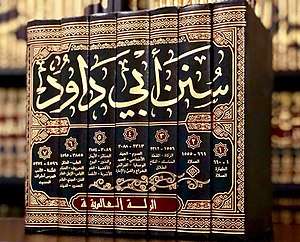Sunan Abu Dawood
Sunan Abu Dawood (Arabic: سنن أبي داود, romanized: Sunan Abī Dāwūd) is one of the Kutub al-Sittah (six major hadith collections), collected by Abu Dawood.[1]
 An all-collection of the Soonan Aboo Dawood | |
| Author | Abu Dawood |
|---|---|
| Original title | سنن أبي داود |
| Language | Arabic |
| Series | Kutub al-Sittah |
| Genre | Hadith collection |
Introduction
Abu Dawood compiled twenty-one books related to Hadith and preferred those ahadith which were supported by the example of the companions of Muhammad. As for the contradictory ahadith, he states under the heading of 'Meat acquired by hunting for a pilgrim': "if there are two contradictory reports from the Prophet (SAW), an investigation should be made to establish what his companions have adopted". He wrote in his letter to the people of Mecca "I have disclosed wherever there was too much weakness in regard to any tradition in my collection. But if I happen to leave a Hadith without any comment, it should be considered as sound, albeit some of them are more authentic than others". Hadith Mursal (a tradition in which a companion is omitted and a successor narrates directly from Muhammad) has also been a matter of discussion among the traditionists. Abu Dawood states in his letter to the people of Mecca: "if a Musnad Hadith (uninterrupted tradition) is not contrary to a Mursal or a Musnad Hadith is not found, then the Mursal Hadith will be accepted though it would not be considered as strong as a Muttasil Hadith (uninterrupted chain)".
The traditions in Sunan Abu Dawood are divided in three categories. The first category consists of those traditions that are mentioned by Bukhari and/or Muslim. The second type of traditions are those which fulfil the conditions of Bukhari or Muslim. At this juncture, it should be remembered that Bukhari said, "I only included in my book Sahih Bukhari authentic traditions, and left out many more authentic ones than these to avoid unnecessary length".
Description
Abu Dawood collected 500,000 hadith, but included only 4,800 in this collection. Sunnis regard this collection as fourth in strength of their six major hadith collections. It took Abu Dawod 20 years to collect the hadiths. He made a series of journeys to meet most of the foremost traditionists of his time and acquired from them the most reliable hadiths, quoting sources through which it reached him. Since the author collected hadiths which no one had ever assembled together, his sunan has been accepted as a standard work by scholars from many parts of the Islamic world,[2] especially after Ibn al-Qaisarani's inclusion of it in the formal canonization of the six major collections.[3][4][5]
Contents
The book is divided into 43 chapters.[6][7][8]
- purification (kitab al-taharah)
- prayer (kitab al-salat)
- the book of the prayer for rain (kitab al-istisqa)
- prayer (kitab al-salat): detailed rules of law about the prayer during journey
- prayer (kitab al-salat): voluntary prayers
- prayer (kitab al-salat): detailed injunctions about ramadan
- prayer (kitab al-salat): prostration while reciting the qur'an
- prayer (kitab al-salat): detailed injunctions about witr
- zakat (kitab al-zakat)
- the book of lost and found items
- the rites of hajj (kitab al-manasik wa'l-hajj)
- marriage (kitab al-nikah)
- divorce (kitab al-talaq)
- fasting (kitab al-siyam)
- jihad (kitab al-jihad)
- sacrifice (kitab al-dahaya)
- game (kitab al-said)
- wills (kitab al-wasaya)
- shares of inheritance (kitab al-fara'id)
- tribute, spoils, and rulership (kitab al-kharaj, wal-fai' wal-imarah)
- funerals (kitab al-jana'iz)
- oaths and vows (kitab al-aiman wa al-nudhur)
- commercial transactions (kitab al-buyu)
- wages (kitab al-ijarah)
- the office of the judge (kitab al-aqdiyah)
- knowledge (kitab al-ilm)
- drinks (kitab al-ashribah)
- foods (kitab al-at'imah)
- medicine (kitab al-tibb)
- divination and omens (kitab al-kahanah wa al-tatayyur)
- the book of manumission of slaves
- dialects and readings of the qur'an (kitab al-huruf wa al-qira'at)
- hot baths (kitab al-hammam)
- clothing (kitab al-libas)
- combing the hair (kitab al-tarajjul)
- signet-rings (kitab al-khatam)
- trials and fierce battles (kitab al-fitan wa al-malahim)
- the promised deliverer (kitab al-mahdi)
- battles (kitab al-malahim)
- prescribed punishments (kitab al-hudud)
- types of blood-wit (kitab al-diyat)
- model behavior of the prophet (kitab al-sunnah)
- general behavior (kitab al-adab)
Commentaries
Sunan Abu Dawood has been translated into numerous languages. The Australian Islamic Library has collected 11 commentaries on this book in Arabic, Urdu and Indonesian.[9]
See also
- Sahih Bukhari
- Sahih Muslim
- Jami al-Tirmidhi
- Sunan al-Sughra
- Either: Sunan ibn Majah, Muwatta Malik
References
- Jonathan A.C. Brown (2007), The Canonization of al-Bukhārī and Muslim: The Formation and Function of the Sunnī Ḥadīth Canon, p.10. Brill Publishers. ISBN 978-9004158399. Quote: "We can discern three strata of the Sunni hadith canon. The perennial core has been the Sahihayn. Beyond these two foundational classics, some fourth/tenth-century scholars refer to a four-book selection that adds the two Sunans of Abu Dawood (d. 275/889) and al-Nasa'i (d. 303/915). The Five Book canon, which is first noted in the sixth/twelfth century, incorporates the Jami' of al-Tirmidhi (d. 279/892). Finally the Six Book canon, which hails from the same period, adds either the Sunan of Ibn Majah (d. 273/887), the Sunan of al-Daraqutni (d. 385/995) or the Muwatta' of Malik b. Anas (d. 179/796). Later hadith compendia often included other collections as well.' None of these books, however, has enjoyed the esteem of al-Bukhari's and Muslim's works."
- "Various Issues About Hadiths". www.abc.se.
- Ignác Goldziher, Muslim Studies, vol. 2, pg. 240. Halle, 1889-1890. ISBN 0-202-30778-6
- Scott C. Lucas, Constructive Critics, Ḥadīth Literature, and the Articulation of Sunnī Islam, pg. 106. Leiden: Brill Publishers, 2004.
- Ibn Khallikan's Biographical Dictionary, translated by William McGuckin de Slane. Paris: Oriental Translation Fund of Great Britain and Ireland. Sold by Institut de France and Royal Library of Belgium. Vol. 3, pg. 5.
- "Abu Dawud". hadithcollection.com. Retrieved Jun 27, 2019.
- "Sunan Abi Dawud". sunnah.com. Retrieved Jun 27, 2019.
- "All books and chapters of sunan abu dawood". www.islamicfinder.org. Retrieved Jun 27, 2019.
- "Sunan Abu Dawood". AUSTRALIAN ISLAMIC LIBRARY.
External links

- Sunan Abu Dawud online at Sunnah.com
- Translation and Commentaries in English, Urdu, Arabic and Indonesian Languages
- English translation of Sunan Abu Dawud
